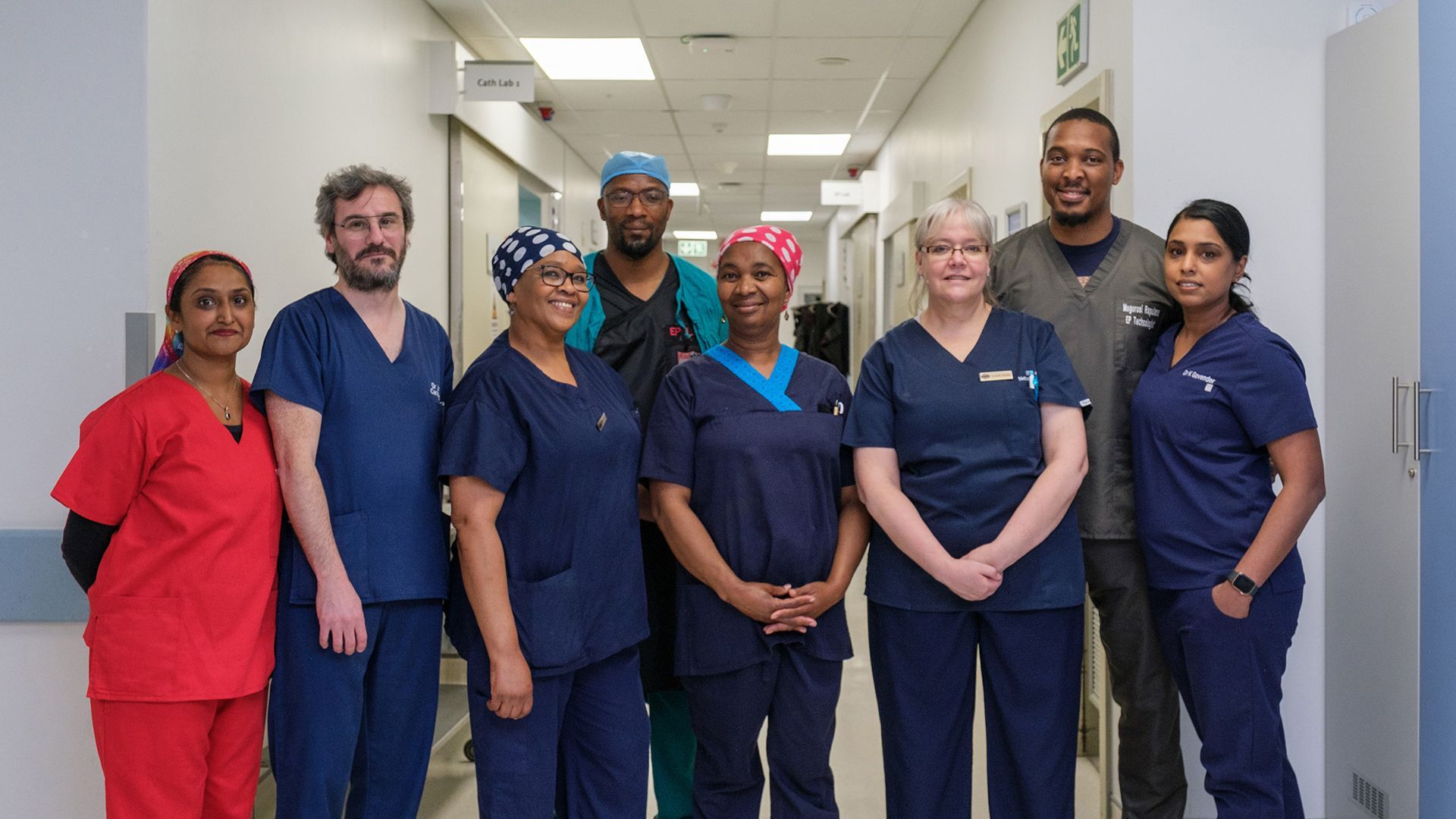Smart pacemaker implanted in Johannesburg hospital – A first for Africa
Meet the team behind Africa’s first implant of the world’s latest pacemaker at Netcare Milpark Hospital in Johannesburg. From skilled specialists to compassionate caregivers, this remarkable lineup is redefining cardiac innovation. From left to right are: Tasmeen Singh, radiographer; Dr Menachem Levin, cardiologist; Sr Matsiditso Mphekweni, registered nurse; Dr Aurence Nkosinathi Mdladla, anaesthetist; Sr Nolundi Notununu, registered nurse; Sr Susarah Klopper, unit manager (Cath Lab and Radial Lounge); Mo Rapulana, clinical technician and Dr Kaveshree Govender, electrophysiologist.
Reducing the burden of cardiac care, safely
Africa’s first implant of the world’s latest pacemaker, The Biotronik Amvia Sky, was recently performed by cardiologists Drs Kaveshree Govender and Menachem (Nachie) Levin and their colleagues at Netcare Milpark Hospital in Johannesburg.
The pioneering procedure followed closely on the heels of the smart pacemaker’s introduction in Europe, which took place in August, at the University Hospital Ghent in Belgium.
“My colleagues and I were privileged to gain early access to the first Amvia Sky pacemaker as it landed in South Africa – an opportunity that truly reflects our country's dynamic landscape of medical innovation,” Dr Levin says.
“This opportunity could not have come at a better time as it enabled us to assist a young man in his early thirties who was diagnosed with cardioinhibitory syncope. This rather complex condition, which results from a change in function of the interaction between blood pressure and heart rate control, profoundly impacted the patient.
“In this patient's case, when his blood pressure dipped, his heart rate steeply dropped to a range of five to ten beats per minute. This hindered his physical capabilities and overall quality of life and presented a substantial risk due to recurrent fainting episodes.
“The patient returned a week after the implantation for the system to be slightly adjusted and personalised to his needs. Less than a month later, his device settings are fully optimised, and his quality of life has markedly improved. For us as a team, seeing such a positive outcome in a relatively short timeframe is always most rewarding,” notes Dr Levin.
“Pacemakers are typically required later in life when older patients encounter difficulties initiating or controlling the electrical impulses at the upper part of their hearts, generally caused by a malfunction of the sinus node, the heart’s natural pacemaker. It can also be caused by a heart block, when there is an interruption or a complete lack of electrical flow in the top part of the heart,” he adds.
This new pacemaker is currently the only system on the market to provide a myocardial contractility sensor and physiologic heart rates through closed-loop stimulation (CLS). This allows the device to function as a conducting system in the upper region of the heart, where its algorithm identifies a drop in blood pressure and can restore the heart's natural myocardial contraction pattern.
Dr Levin says this pacing strategy is the latest approach to ensure optimal reproduction of the heart's normal conduction system. “Unlike traditional right ventricular pacing, it activates the ventricles more by utilising the heart's own electrical system below the level of the pathology, making the heart's conduction system work more efficiently. A further first and unique feature in this device is its capacity to significantly enhance safety and efficiency for patients who may periodically require access to Magnetic Resonance Imaging [MRI] scanning.”
According to Dr Levin, recognised as a stroke-ready facility, Netcare Milpark Hospital is equipped to provide advanced stroke interventions that can, in many instances, mitigate the severity of a stroke and save lives if initiated promptly after the stroke's onset.
“Many severe stroke cases are referred to Netcare Milpark Hospital for medical assistance, and several patients have pacemakers. Because MRI scanning can pose a risk to patients due to interference with the device, technologists must adjust pacemakers to a safe mode before the scan, monitor the patient closely during the procedure and reprogramme the pacemaker thereafter.
“Just as in the case of a heart attack where time is critical in unblocking arteries in the heart, when dealing with clots in the arteries supplying the brain with blood supply, every second counts. This device has the ability to automatically sense when the patient is entering an MRI environment. It then changes the pacing programming to a safe mode for the environment. Once out of the MRI, the device automatically changes back to the initial device settings. This saves valuable time, which in turn directly affects positive outcomes, he notes.
Dr Levin expressed his gratitude and that of his colleagues for the opportunity to access the very first Amvia Sky pacemaker to arrive on the African continent while recognising Netcare for supporting the use of cutting-edge technologies in the interest of patients. “I wish to acknowledge the foresight of Netcare’s management for embracing the merits of new technologies, processes and products that can improve healthcare outcomes. As clinicians, it is heartening to see how healthcare innovation can transform lives while revolutionising medical practices,” Dr Levin said.
Commenting on the introduction of the new technology, Jacques du Plessis, managing director of Netcare's Hospital Division, emphasised the essential role of patient-centric technologies within the healthcare sector and their innovative capabilities to address the needs of patients, doctors and healthcare funders.
"In the realm of healthcare, where every decision carries profound weight, our commitment to patient-centric technologies is unwavering. At Netcare, we stand as leaders in the pursuit of personalised medicine, weaving enhanced therapies and greater efficiency into the very fabric of our care. This dedication enables us to help reshape lives, shorten hospital stays, and etch stories of remarkable recovery, one patient at a time,” he concluded.
For further information on the cardiovascular treatment services offered at Netcare hospitals, please visit
https://www.netcare.co.za/netcare-hospitals/specialist-services/cardiac.













